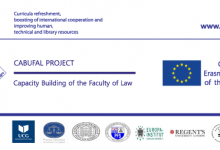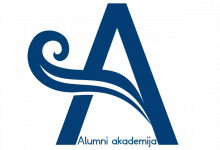Faculty of Law / CIVIL SAFETY AND CRIMINOLOGY / CRIMINAL LAW
| Course: | CRIMINAL LAW/ |
| Course ID | Course status | Semester | ECTS credits | Lessons (Lessons+Exercises+Laboratory) |
| 448 | Obavezan | 3 | 6 | 2+1+0 |
| Programs | CIVIL SAFETY AND CRIMINOLOGY |
| Prerequisites | |
| Aims | |
| Learning outcomes | After passing this exam, it is expected that the student will be able to: define and explain the system, certain institutes and concepts of criminal law; recognize and explain criminal norms that regulate general institutes of criminal law in order to connect them with the norms that regulate the specific crimes; differentiate concepts and institutes of general and special parts of criminal law and their interconnection; analyze the factual description of an event from which a criminal matter originates and determine whether there are conditions for the application of certain general intitutes of criminal law; compare specific similar general institutes of criminal law in order to decide which of them will have to be applied to the specific situation in practice. |
| Lecturer / Teaching assistant | |
| Methodology |
| Plan and program of work | |
| Preparing week | Preparation and registration of the semester |
| I week lectures | |
| I week exercises | |
| II week lectures | |
| II week exercises | |
| III week lectures | |
| III week exercises | |
| IV week lectures | |
| IV week exercises | |
| V week lectures | |
| V week exercises | |
| VI week lectures | |
| VI week exercises | |
| VII week lectures | |
| VII week exercises | |
| VIII week lectures | |
| VIII week exercises | |
| IX week lectures | |
| IX week exercises | |
| X week lectures | |
| X week exercises | |
| XI week lectures | |
| XI week exercises | |
| XII week lectures | |
| XII week exercises | |
| XIII week lectures | |
| XIII week exercises | |
| XIV week lectures | |
| XIV week exercises | |
| XV week lectures | |
| XV week exercises |
| Student workload | |
| Per week | Per semester |
| 6 credits x 40/30=8 hours and 0 minuts
2 sat(a) theoretical classes 0 sat(a) practical classes 1 excercises 5 hour(s) i 0 minuts of independent work, including consultations |
Classes and final exam:
8 hour(s) i 0 minuts x 16 =128 hour(s) i 0 minuts Necessary preparation before the beginning of the semester (administration, registration, certification): 8 hour(s) i 0 minuts x 2 =16 hour(s) i 0 minuts Total workload for the subject: 6 x 30=180 hour(s) Additional work for exam preparation in the preparing exam period, including taking the remedial exam from 0 to 30 hours (remaining time from the first two items to the total load for the item) 36 hour(s) i 0 minuts Workload structure: 128 hour(s) i 0 minuts (cources), 16 hour(s) i 0 minuts (preparation), 36 hour(s) i 0 minuts (additional work) |
| Student obligations | |
| Consultations | |
| Literature | |
| Examination methods | |
| Special remarks | |
| Comment |
| Grade: | F | E | D | C | B | A |
| Number of points | less than 50 points | greater than or equal to 50 points and less than 60 points | greater than or equal to 60 points and less than 70 points | greater than or equal to 70 points and less than 80 points | greater than or equal to 80 points and less than 90 points | greater than or equal to 90 points |
Faculty of Law / CIVIL SAFETY AND CRIMINOLOGY / INTERNATIONAL PUBLIC LAW
| Course: | INTERNATIONAL PUBLIC LAW/ |
| Course ID | Course status | Semester | ECTS credits | Lessons (Lessons+Exercises+Laboratory) |
| 458 | Obavezan | 3 | 6 | 2+1+0 |
| Programs | CIVIL SAFETY AND CRIMINOLOGY |
| Prerequisites | |
| Aims | |
| Learning outcomes | After passing this exam, it is expected that the student will be able to: analyze and explain the origin, development of public international law, primary sources and principles as well as subjects of international law; define and explain the concept of the state, the influence of security services on peace and security in the country, human rights and the concept of human rights; properly interpret the sources of law of the sea and the protection of ports, vessels at sea in accordance with international law, protection of diplomatic facilities, diplomatic representatives, as well as the rules of international humanitarian law; carry out a proper review of UN bodies, their importance and role as well as the practice of international courts; work independently in the organs and institutions in his/her country, in diplomatic posts, as well as in other organs and institutions of other countries and international organizations. |
| Lecturer / Teaching assistant | |
| Methodology |
| Plan and program of work | |
| Preparing week | Preparation and registration of the semester |
| I week lectures | |
| I week exercises | |
| II week lectures | |
| II week exercises | |
| III week lectures | |
| III week exercises | |
| IV week lectures | |
| IV week exercises | |
| V week lectures | |
| V week exercises | |
| VI week lectures | |
| VI week exercises | |
| VII week lectures | |
| VII week exercises | |
| VIII week lectures | |
| VIII week exercises | |
| IX week lectures | |
| IX week exercises | |
| X week lectures | |
| X week exercises | |
| XI week lectures | |
| XI week exercises | |
| XII week lectures | |
| XII week exercises | |
| XIII week lectures | |
| XIII week exercises | |
| XIV week lectures | |
| XIV week exercises | |
| XV week lectures | |
| XV week exercises |
| Student workload | |
| Per week | Per semester |
| 6 credits x 40/30=8 hours and 0 minuts
2 sat(a) theoretical classes 0 sat(a) practical classes 1 excercises 5 hour(s) i 0 minuts of independent work, including consultations |
Classes and final exam:
8 hour(s) i 0 minuts x 16 =128 hour(s) i 0 minuts Necessary preparation before the beginning of the semester (administration, registration, certification): 8 hour(s) i 0 minuts x 2 =16 hour(s) i 0 minuts Total workload for the subject: 6 x 30=180 hour(s) Additional work for exam preparation in the preparing exam period, including taking the remedial exam from 0 to 30 hours (remaining time from the first two items to the total load for the item) 36 hour(s) i 0 minuts Workload structure: 128 hour(s) i 0 minuts (cources), 16 hour(s) i 0 minuts (preparation), 36 hour(s) i 0 minuts (additional work) |
| Student obligations | |
| Consultations | |
| Literature | |
| Examination methods | |
| Special remarks | |
| Comment |
| Grade: | F | E | D | C | B | A |
| Number of points | less than 50 points | greater than or equal to 50 points and less than 60 points | greater than or equal to 60 points and less than 70 points | greater than or equal to 70 points and less than 80 points | greater than or equal to 80 points and less than 90 points | greater than or equal to 90 points |
Faculty of Law / CIVIL SAFETY AND CRIMINOLOGY / CRIMINAL PROCEDURE LAW
| Course: | CRIMINAL PROCEDURE LAW/ |
| Course ID | Course status | Semester | ECTS credits | Lessons (Lessons+Exercises+Laboratory) |
| 1174 | Obavezan | 4 | 6 | 2+1+0 |
| Programs | CIVIL SAFETY AND CRIMINOLOGY |
| Prerequisites | |
| Aims | |
| Learning outcomes | After passing this exam, it is expected that the student will be able to: explain the basic concepts of criminal procedural law such as criminal procedural action, criminal procedural relation, the subject of criminal proceedings, object and task of the criminal proceedings; ascertain and explain the mutual relationship between substantive criminal law and criminal procedure law; properly interpret regulations that govern criminal procedures; connect relevant facts to legal rules and, based on that, determine the rights and duties of individual subjects in criminal proceedings; properly interpret regulations about the role and powers of the police in taking operational and evidentiary actions in preliminary investigation and criminal proceedings; prepare and submit criminal complaints, keep official records and a record of actions taken in the process of clarifying and resolving criminal cases. |
| Lecturer / Teaching assistant | |
| Methodology |
| Plan and program of work | |
| Preparing week | Preparation and registration of the semester |
| I week lectures | |
| I week exercises | |
| II week lectures | |
| II week exercises | |
| III week lectures | |
| III week exercises | |
| IV week lectures | |
| IV week exercises | |
| V week lectures | |
| V week exercises | |
| VI week lectures | |
| VI week exercises | |
| VII week lectures | |
| VII week exercises | |
| VIII week lectures | |
| VIII week exercises | |
| IX week lectures | |
| IX week exercises | |
| X week lectures | |
| X week exercises | |
| XI week lectures | |
| XI week exercises | |
| XII week lectures | |
| XII week exercises | |
| XIII week lectures | |
| XIII week exercises | |
| XIV week lectures | |
| XIV week exercises | |
| XV week lectures | |
| XV week exercises |
| Student workload | |
| Per week | Per semester |
| 6 credits x 40/30=8 hours and 0 minuts
2 sat(a) theoretical classes 0 sat(a) practical classes 1 excercises 5 hour(s) i 0 minuts of independent work, including consultations |
Classes and final exam:
8 hour(s) i 0 minuts x 16 =128 hour(s) i 0 minuts Necessary preparation before the beginning of the semester (administration, registration, certification): 8 hour(s) i 0 minuts x 2 =16 hour(s) i 0 minuts Total workload for the subject: 6 x 30=180 hour(s) Additional work for exam preparation in the preparing exam period, including taking the remedial exam from 0 to 30 hours (remaining time from the first two items to the total load for the item) 36 hour(s) i 0 minuts Workload structure: 128 hour(s) i 0 minuts (cources), 16 hour(s) i 0 minuts (preparation), 36 hour(s) i 0 minuts (additional work) |
| Student obligations | |
| Consultations | |
| Literature | |
| Examination methods | |
| Special remarks | |
| Comment |
| Grade: | F | E | D | C | B | A |
| Number of points | less than 50 points | greater than or equal to 50 points and less than 60 points | greater than or equal to 60 points and less than 70 points | greater than or equal to 70 points and less than 80 points | greater than or equal to 80 points and less than 90 points | greater than or equal to 90 points |
Faculty of Law / CIVIL SAFETY AND CRIMINOLOGY / CRIMINALISTICS V - METHODICS
| Course: | CRIMINALISTICS V - METHODICS/ |
| Course ID | Course status | Semester | ECTS credits | Lessons (Lessons+Exercises+Laboratory) |
| 8059 | Obavezan | 6 | 6 | 2+1+0 |
| Programs | CIVIL SAFETY AND CRIMINOLOGY |
| Prerequisites | |
| Aims | |
| Learning outcomes | After passing this exam, it is expected that the student will be able to: define and understand basic concepts of criminology methodology (Criminology V); distinguish and recognize basic characteristics of general, political and economic crime; properly apply circumstantial methods of detecting and resolving criminal offenses; analyze a specific crime and, according to that crime, take appropriate measures and actions. |
| Lecturer / Teaching assistant | |
| Methodology |
| Plan and program of work | |
| Preparing week | Preparation and registration of the semester |
| I week lectures | |
| I week exercises | |
| II week lectures | |
| II week exercises | |
| III week lectures | |
| III week exercises | |
| IV week lectures | |
| IV week exercises | |
| V week lectures | |
| V week exercises | |
| VI week lectures | |
| VI week exercises | |
| VII week lectures | |
| VII week exercises | |
| VIII week lectures | |
| VIII week exercises | |
| IX week lectures | |
| IX week exercises | |
| X week lectures | |
| X week exercises | |
| XI week lectures | |
| XI week exercises | |
| XII week lectures | |
| XII week exercises | |
| XIII week lectures | |
| XIII week exercises | |
| XIV week lectures | |
| XIV week exercises | |
| XV week lectures | |
| XV week exercises |
| Student workload | |
| Per week | Per semester |
| 6 credits x 40/30=8 hours and 0 minuts
2 sat(a) theoretical classes 0 sat(a) practical classes 1 excercises 5 hour(s) i 0 minuts of independent work, including consultations |
Classes and final exam:
8 hour(s) i 0 minuts x 16 =128 hour(s) i 0 minuts Necessary preparation before the beginning of the semester (administration, registration, certification): 8 hour(s) i 0 minuts x 2 =16 hour(s) i 0 minuts Total workload for the subject: 6 x 30=180 hour(s) Additional work for exam preparation in the preparing exam period, including taking the remedial exam from 0 to 30 hours (remaining time from the first two items to the total load for the item) 36 hour(s) i 0 minuts Workload structure: 128 hour(s) i 0 minuts (cources), 16 hour(s) i 0 minuts (preparation), 36 hour(s) i 0 minuts (additional work) |
| Student obligations | |
| Consultations | |
| Literature | |
| Examination methods | |
| Special remarks | |
| Comment |
| Grade: | F | E | D | C | B | A |
| Number of points | less than 50 points | greater than or equal to 50 points and less than 60 points | greater than or equal to 60 points and less than 70 points | greater than or equal to 70 points and less than 80 points | greater than or equal to 80 points and less than 90 points | greater than or equal to 90 points |











